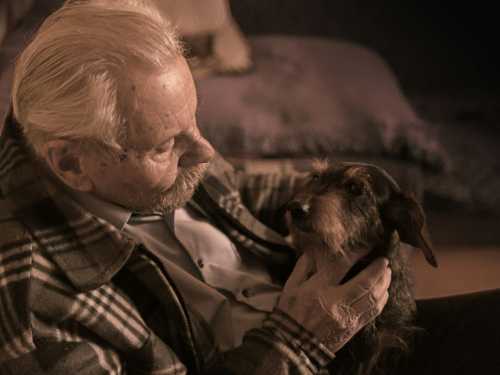
A pensioner lives in our house, my neighbor on the landing, he regularly went for a walk with his dog.
The animal was already old, and all the neighbors recognized the dog by its bright jacket in winter and funny sweater in summer.
The clothes for the pet probably cost more than his own, but my neighbor wasn't bothered by that at all. He loved his pet very much and didn't skimp on it at all, perhaps even to his own detriment.
I hadn't seen him for a long time and didn't even know where he had gone. I hadn't noticed the dog in the yard in a long time either.
The other day I saw a neighbor leaving the store with a large bag of cat food.
I greeted the pensioner, asked about his life, and delicately asked if he had gotten a cat.
The neighbor seemed to smile, but it seemed that at that moment he was hiding a deep sadness. It turned out that his dog had died quite recently. Everything fell into place in my head: the pensioner had hardly left his apartment since then.
He lived with it for 16 years and became very attached to it. His granddaughter brought a very small puppy from the yard, and since then he has kept the dog for himself, although he didn't plan to.
The neighbor didn't get a cat, he admits that he was never a big cat lover. But he bought the food on purpose: for stray animals in foster care (or, to put it simply, in a shelter).
Since the dog died, his daughter and son-in-law have been trying to help the pensioner recover. To do this, they took him to a pet shelter – maybe he will want to give a home to some unfortunate animal.
But it's very difficult to choose someone, especially right away. The neighbor couldn't choose a favorite.
He says that the atmosphere was very depressing: dozens of sad eyes are looking at you, and all animals need a caring owner, kind hands, and a bowl of delicious food.
The shelter exists mainly on donations, but they accept them in any form: food, medicine, beds, help with cleaning, and, of course, money.
The neighbor said that now he spends every penny he saves on food, cereals, and bones for his cats and dogs. His daughter mostly brings food and other small items when needed, and the pensioner says that he still can't bring himself to go there again.
By the way, he also said that he saves money for the shelter's needs, because volunteers not only feed and keep animals warm, but also treat and sterilize them at their own expense.
The pensioner said that he is saving most of the money: he wants to visit the animals before the New Year and hand over the money to the volunteers. And when it gets warmer, he wants to build kennels for the local dogs. And he hopes to take some animal home.
To be honest, I was pleasantly surprised by such a desire to help. The person really took this matter seriously, and it seems that this enthusiasm is contagious.
The pensioner has regained control of himself and is acting decisively. Such an act is worthy of respect.





